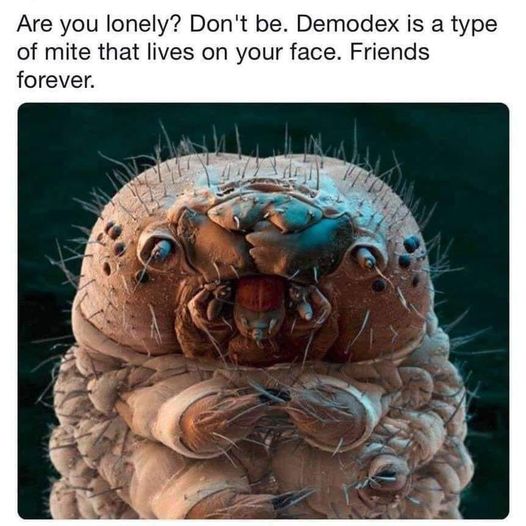this post was submitted on 26 Sep 2024
598 points (97.5% liked)
Science Memes
11021 readers
3619 users here now
Welcome to c/science_memes @ Mander.xyz!
A place for majestic STEMLORD peacocking, as well as memes about the realities of working in a lab.

Rules
- Don't throw mud. Behave like an intellectual and remember the human.
- Keep it rooted (on topic).
- No spam.
- Infographics welcome, get schooled.
This is a science community. We use the Dawkins definition of meme.
Research Committee
Other Mander Communities
Science and Research
Biology and Life Sciences
- [email protected]
- [email protected]
- [email protected]
- [email protected]
- [email protected]
- [email protected]
- [email protected]
- [email protected]
- [email protected]
- [email protected]
- [email protected]
- [email protected]
- [email protected]
- [email protected]
- [email protected]
- [email protected]
- [email protected]
- [email protected]
- [email protected]
- [email protected]
- [email protected]
- [email protected]
- [email protected]
- [email protected]
- !reptiles and [email protected]
Physical Sciences
- [email protected]
- [email protected]
- [email protected]
- [email protected]
- [email protected]
- [email protected]
- [email protected]
- [email protected]
- [email protected]
Humanities and Social Sciences
Practical and Applied Sciences
- !exercise-and [email protected]
- [email protected]
- !self [email protected]
- [email protected]
- [email protected]
- [email protected]
Memes
Miscellaneous
founded 2 years ago
MODERATORS
you are viewing a single comment's thread
view the rest of the comments
view the rest of the comments

Wait, 0.3mm is huge, you should be able to see that. I don't think this is right.
Combine the size with the fact that they are semi transparent and live in hair follicles and sebaceous glands, both of which are essentially under the skin, and that's why you don't generally see them.
0.3mm in length, not diameter. Yes, you can see them, but they just look like dead skin/gunk to our eyes.
Image1
Image2
Image3
Gallery with visible accumulation of mites on hairs
Maybe we do see them, but mistake them for bits of skin or dirt.
Agreed. 1/64th of an inch is .016". An average human hair is .003" in diameter, that would be as long as five hairs wide. You wouldn't even need a magnifier to see the largest ones.